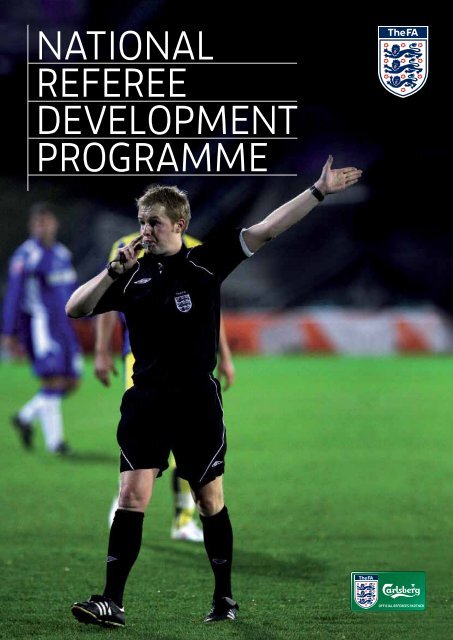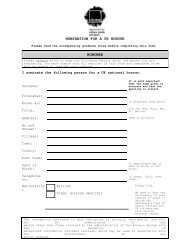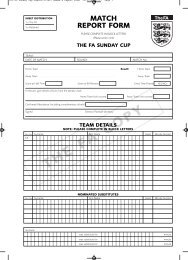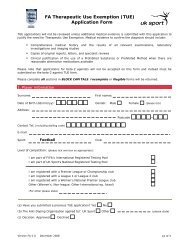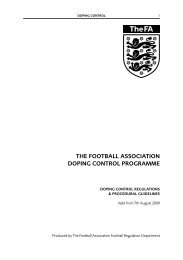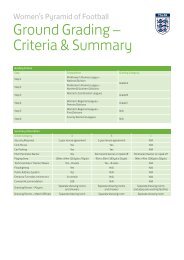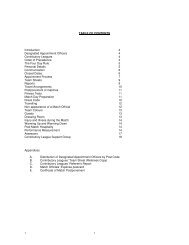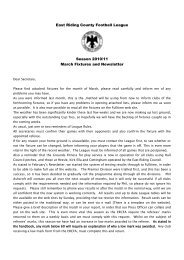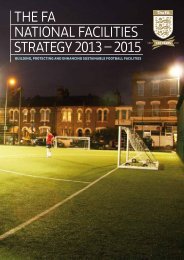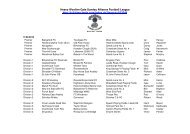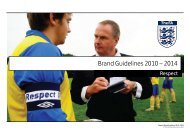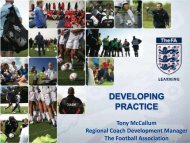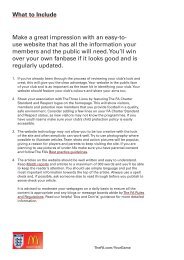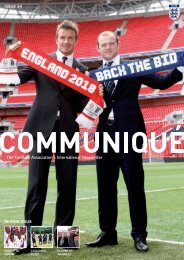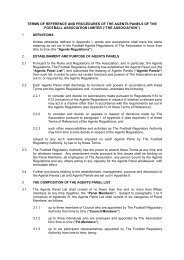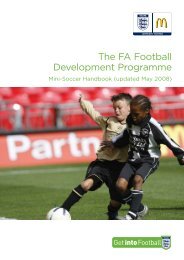NatioNal RefeRee DevelopmeNt pRogRamme - The Football ...
NatioNal RefeRee DevelopmeNt pRogRamme - The Football ...
NatioNal RefeRee DevelopmeNt pRogRamme - The Football ...
Create successful ePaper yourself
Turn your PDF publications into a flip-book with our unique Google optimized e-Paper software.
NationalRefereeDevelopmentProgramme
IntroductionKey Partners & Personnel within the Programme<strong>The</strong> <strong>Football</strong> Association’sNational Referee DevelopmentProgramme is a scheme designedfor referees involved in 11 v 11football. It is an initiative which iscommitted to training, retainingand developing enthusiastic,committed referees with supportand coaching in a safe andconstructive learning environment.This will allow confidence to flourish andindividual aspirations to be achieved.<strong>The</strong> programme will have no age restrictionsplaced upon it, other than the criteria forattending the Young Referees Conferencefor those considered at Stage 4, which willbe explained later in the document.This programme will support <strong>The</strong> <strong>Football</strong>Association in achieving their target of8000 new active referees by 2012 and tobuild strong foundations for the future.This will be achieved by each County<strong>Football</strong> Association under the leadership oftheir Referee Development Officer/s (RDOs)managing the programme. <strong>The</strong>y will appointother staff from their volunteer workforce tosupport them in achieving this, including anassistant who may be the County TrainingOfficer and a team of Mentors and Coachesto support and develop referees throughthe programme. <strong>The</strong> scheme will rely onthe County establishing or building uponrelationships with leagues and clubs who willbecome their partners in providing refereeswith the appropriate environment for theirgames to be supported and developed.<strong>The</strong> programme will also rely on countiesforming close links with the Referees’Association (RA) through their branchesand societies to support the <strong>Football</strong>Association’s close working relationshipwith the RA under the RA-FA initiative toincrease and improve in-service trainingacross the country. Further details on allthe roles and the structure will follow laterin this document.<strong>The</strong> <strong>Football</strong> Association (FA)As the national governing body the FAwill be responsible for overseeing theprogramme under the leadership of theNational Referee Manager for Recruitment,Retention and Development.County <strong>Football</strong> Association (CFA)As the local representative of <strong>The</strong> FA,the CFA will ensure the programme ismanaged effectively through the auspicesof the Referee Development Officer (RDO).<strong>The</strong> Referees’ Association (RA)<strong>The</strong> RA will support the programme throughtheir branches and societies in providingregular meetings as part of the RA-FAinitiative and in-service trainingand presentations from guest speakers.RA-FA<strong>The</strong> working partnership between the RAand FA to support the recruitment, retentionand development of referees by providingmembership of the RA and in-service trainingfrom the FA and other benefits fromco-operation between the two organisationsfor members of the programme.Referee Development Officer (RDO)<strong>The</strong> RDO is responsible for managing theprogramme throughout the County.Workforce<strong>The</strong> workforce means any other volunteer/person who works for or within the NRDP.Partner LeagueAny league who fulfils the criteria (listedelsewhere in this document) and includingbeing part of the Respect Programme willbe eligible to join the scheme and in returnwill be awarded the National RefereesDevelopment Programme Partner ‘symbol’to be displayed as they wish.Partner ClubAny club who fulfils the criteria (listedelsewhere in this document) will be eligibleto join the scheme and in return will beawarded the National Referee DevelopmentProgramme Partner ‘symbol’ to be displayedas they wish. This club will need to be partof a Respect League and following theguidelines of the Respect Programme.Referee Academy/School of ExcellenceAny Referee Academy or School ofExcellence supported by the CFA will formpart of this programme. This may be a linkto a professional club in the county or bea county wide academy that supports thedevelopment of referees in Stages 3 and 4of the programme (further details later inthis document).Referee Mentor (RM)A RM will be allocated to every new memberin the programme to support them throughtheir initial 6 games and first season asa referee (further details will be listedelsewhere in this document).Referee Coach (RC)A RC will be allocated to members of thescheme from their second year onwards(details of the role and responsibilities arelisted elsewhere in this document).Regional Development Co-ordinator (RDC)A RDC will be appointed by <strong>The</strong> FA foreach of the 8 <strong>Football</strong> Regions in England.<strong>The</strong>ir role will be to look after Stage 4 ofthe programme in their region. (Full detailsof their role and responsibilities are listedelsewhere in this document).County Training Officer (CTO)<strong>The</strong> CTO when appointed is responsiblefor supporting the RDO in managingthe programme.4 National Referee Development ProgrammeNational Referee Development Programme 5
National RefereeDevelopment Programme (NRDP) ProcessBasic Referee Training CourseModules 1 – 3 successfully completed and RAMembership offeredNational RefereeDevelopment Programme(For Module 4 - First 6 games)<strong>The</strong> FA National RefereeDevelopment Programme has beendesigned to ensure that all refereesare supported in completing theirinitial 6 games and are retainedthrough the early stages of theirrefereeing career. Beyond thisstage, once they have finished theirbasic training, those demonstratingfurther potential and commitmentafter their first season are givenevery opportunity to fulfil theirpotential and develop onto the laterstages of the programme.Exit Strategy via1. Personal choice2. Failure to adhere to the principles of the programmeExit Strategy via1. Personal choice2. Failure to adhere to the principles of the programmeStage 1: Entry to the ProgrammeRDO/CTO & Referee Tutor to allocate Level 9 referee to Partner League/Club to complete initial 6 gamesand allocate mentorStage 1 completed when referee completes Module 5 and is reclassified to Level 8 or 7.Stage 2: Support and RetentionRDO/CTO oversees placement of Level 8 or 7 referees with Partner League(s) or Partner Club and reaffirmsmentor allocation. Mentor to establish goals / targets for referee.Referees will stay in Stage 2 for a maximum of 1 playing season however referees can be accelerated to Stage3 if identified as having potential to progress more quickly.Exit Strategy via1. Personal choice2. Failure to adhere to the principles of the programme3. Failure to show potential at this stageStage 3: Development & ProgressionReferee invited to join County FA Referee Academy/School of Excellence or similar set up. RDO oversees/co-ordinates and ensures that all referees are allocated a Coach. This stage supports referees to reachLevel 5/4.Exit Strategy via1. Personal choice2. Failure to adhere to the principles of the programme3. Promotion to Level 3Stage 4: Further Development & ProgressionReferees who display exceptional potential during Stage 3 will be nominated for and be part of a RegionalDevelopment Group and may attend the Young Referees Conference (if aged 18-25) exchange programmesetc. <strong>The</strong>y will have reached Level 4 or be an exceptional level 5.6 National Referee Development ProgrammeNational Referee Development Programme 7
National Referee DevelopmentProgramme OutlineStage 1: Entry to the Programme:• Registered with County FA as Level 9• Associate member of the RA and possiblyFull member of the RA• Successfully completed Modules 1-3in the Basic Referee Training Course• Received Respect Programme training• Advised of inclusion in the first stageof the programme• Received Safeguarding Childrenawareness training• CRB cleared (where applicable)• Independent Safeguarding Authority (ISA)checked (where applicable)• Have signed a Referee Code of Conduct• Be placed with suitable partnerleagues/clubs• To be assigned to a Mentor• To be advised of the criteria formoving to Stage 2 of the programmeExit Strategy via:• Personal choice - RDO facilitatesplacement in appropriate leagueto encourage retention• Failure to adhere to the principlesof the programmeStage 2: Support and Retention:• Entry to the programme is subject tohaving completed Stage 1 or have alreadyoperated at Level 8 or 7• <strong>The</strong> Code of Conduct is reinforced• Assignment to Referee Mentor reaffirmed• Personal targets are discussed with thereferee’s mentor• Advised of partner leagues/clubs andassigned (if agreed with referee)• Advised of the in-service trainingprogramme for the season• Attend a minimum of one CFA / RA-FAin-service training event in the programme• Advised how they can progress further• Other benefits to be determinedExit Strategy via:• Personal choice• Failure to adhere to the principlesof the programmeStage 3: Development andProgression:• Entry to the programme is subject tohaving completed Stage 2 or havingdisplayed potential to progress• CFAs may introduce a Fitness Assessmentas part of the criteria• Attend an induction event• Code of Conduct to be revised and signed• Assigned to a Referee Coach (RC)• Personal targets discussed with RC• Allocated to the CFA Referee Academy,School of Excellence or similar set up• Advised of the programme for the season• Attend a minimum of 50% of appropriateCFA / RA-FA in-service training events inthe programme• Advise what other benefits are availablein the current season and how toprogress furtherExit Strategy:• Personal choice• Failure to adhere to the principlesof the programme• Failure to show potential at this stageStage 4: Further Developmentand Progression• Entry to the programme is subjectto having completed Stage 3, havingdisplayed potential to progress and beennominated by the County FA• Advised they are now part of theRegional Development Group and maybe nominated for the Young RefereesConference (criteria permitting)• Introduced to the Regional DevelopmentCo-ordinator who will oversee this stageof their development• Attend an induction event• Code of Conduct to be revised and signed• Review and reassigned to aReferee Coach (RC)• Personal targets discussed with RC• Advised of the programme for the season• Attend a minimum of 75% of theRegional Events• To attend other CFA, RA-FA in-serviceevents if they wish or are invited to supporttheir more junior colleagues• Advise what other opportunities areavailable for referees involved in this stagewhich are not age restricted• Maximum time at Stage 4 is normallythree seasons unless there are specialcircumstancesExit strategy:• Personal choice• Failure to adhere to the principlesof the programme• Promotion to Level 38National Referee Development ProgrammeNational Referee Development Programme 9
Stage 4: Further DevelopmentAND ProgressionFor the fourth and final stage of theprogramme each year, every County willbe invited to nominate a maximum of4 Referees who have demonstrated potentialin Stage 3. Before the nominations are made,a discussion should take place betweenthe RDO and Regional DevelopmentCo-ordinator (RDC) as to the suitability ofeach individual. When this has been agreed,the group of Referees would form a RegionalDevelopment Group, who would attend aminimum of two sessions a year with theRDC, one of which should contain a fitnessassessment/test.From this group, the RDC will nominate thecandidates to attend the Young RefereesConference each year providing theymeet the criteria. Other opportunities notrestricted by age will be available.• All referees will be allocated/re-allocateda Referee Coach (RC) who maybe theirexisting RC but this may change as nowthey have been highlighted as one ofthe newer referees in their county withpotential and will be working in theregional group• <strong>The</strong> referee may continue to operatewithin the Partner League(s) and for thePartner Club(s) as they did in Stage 2/3but will also be asked to operate in leaguesoutside of this to broaden their knowledgeand experience• Ideally the referee will have reachedLevel 4 through the normal promotionprocesses and will be operating as aSupply League Referee and ContributoryLeague Assistant Referee or be anexceptional Level 5• <strong>The</strong>y will be expected to attend aminimum of 75% of the Regional Events• To attend other CFA, RA-FA in-serviceevents if they wish or are invited to supporttheir more junior colleaguesReferees may leave theprogramme for thefollowing reasons:Failure to adhere to the principlesof the programme• This may include breaching the Codeof Conduct or any other reason and willbe followed up by the RC and the FA andmay include removal from the programmeand passed on to the RDO for furtheraction if necessaryPersonal choice• <strong>The</strong> referee may find the commitmentrequired too much or may wish towithdraw for any other reason. At thispoint the RDO will speak to the referee totry and maintain retention by allocatingthe referee to a local league outside of theprogramme or possibly returning toStage 3 within their Referee Academy/School of ExcellencePromotion to Level 3• When this level is achieved therequirements of the referee are such thattheir needs are dealt with at Senior RefereeDevelopment Level. <strong>The</strong>se referees will beencouraged to take part in the programmein other roles should they wish to do soThree years in programme• Referees will have a maximum of threeyears in Stage 4 of the programme unlessthere are special circumstances12 National Referee Development ProgrammeNational Referee Development Programme 13
Operating Criteria for Partner Leagues and Clubs<strong>The</strong> success of <strong>The</strong> FA NationalReferee Development Programmein producing and retaining qualityreferees will be determined bythe choice of Partner Leaguesand Clubs that are selected bythe FA and CFAs to supportthe programme.All leagues and clubs used in the programmewill be signed up to and actively participatingin the FA Respect Programme.<strong>The</strong>se partners need to be aware of theirresponsibilities towards the development ofselected referees and create an environmentwhere potential and commitment will beencouraged to develop.To ensure that all partners are fullyconversant with these responsibilitiesthe following operating criteria needsto be written into the National RefereeDevelopment Programme: Code of Conductfor Clubs and Officials. This document shouldbe signed by all parties and continuallymonitored to ensure on-going commitment.Partner LeaguesApproved National Referee DevelopmentProgramme League status will only beafforded to those leagues which:• Are affiliated to the FA or CFA• Are signed up to the FA RespectProgramme• Ensure all key officers are CRB/ISA checkedand have completed a SafeguardingChildren Workshop• Ensure all key personnel are conversantwith the objectives of the National RefereeDevelopment Programme including theReferee Appointments Officer (who isdealt with separately elsewhere)• Organise fixtures and appointmentswith at least one weeks’ notice ensuringcopies are sent to both the referee andthe RM or RC• Involve the referee in any appropriatetraining organised by the league• Are either Charter Standard Leaguesor are working towards achievingCharter Standard League status or candemonstrate their commitment torefereeing best practise principles througha development plan• Abide by the NRDP Code of Conductfor Clubs• Encourage partnerships betweenbordering County FAsCharter Standard LeaguesWhere a league has achieved CharterStandard League status or is working towardsthis, it will have or will be working upon adevelopment plan. <strong>The</strong> ideas and principlescontained within the National RefereesDevelopment Programme are an ideal fitfor leagues that want to commit to thedevelopment of refereeing in the workforcesection of these development plans.County RDO’s and League Officials shouldtherefore actively encourage leagues toinclude elements of the NRDP in their planswhere this will clearly benefit the leagues,their clubs and referees.Partner ClubsPartner Club status will only be afforded tothose clubs which:• Meet all Safeguarding Children,CRB and ISA requirements• Member of a league operating theFA Respect Programme• Provide constructive feedback onperformance to referee and refereementor as requested• Provide a safe environment for refereesat all times• Provide appropriate changing andshowering facilities ensuring separateareas are available for females and thosereferees aged under-16• Give referee and Referee Mentor at leastone weeks’ notice of forthcoming fixtures• Ensure correct match fees are paid toreferees at agreed time• Ensure appropriate Competition Rules areavailable for each match to be officiated• Provide appropriately qualified AssistantReferees as required• Ensure that Partner Clubs retain theircommitment to the National RefereeDevelopment Programme. <strong>The</strong> FA andCFAs should endeavour to regularlyup-date them on the programme’sprogress and address any issues thatmay be raised• Abide by the NRDP Code of Conductfor ClubsReferee Mentors (RM) and RefereeCoaches (RC) should be charged with theresponsibility of ensuring that ApprovedClubs abide by the Code of Conduct. Anyconcerns should initially be addressed tothe appropriate club contact. Should thisfail to improve the situation, the RM or RCshould bring the concern to the attentionof the RDO.Referees Appointments Officer<strong>The</strong> key league contact with the refereeand RM/RC will be the Referees’Appointment Officer and it is imperativethat this officer is fully conversant with theirresponsibilities to the National RefereeDevelopment Programme.<strong>The</strong> National Referee DevelopmentProgramme will require Referees’Appointment Officers to:• Attend update meetings held by theFA or CFA• Liaise closely with the RM/RC to discussforthcoming appointments, ensuringgames of an appropriate level are offered• Update the RM/RC on performancefeedback – including club marksand assessmentsSupport to Approved Leagues and Clubs<strong>The</strong> FA and CFAs acknowledge that theNational Referee Development Programmewill be unable to retain or develop matchofficials without the support of their networkof Partner Leagues and ClubsIt is therefore imperative that the FA andCFA give on-going support and advice tothese partners. This support should includeappropriate training to officers, guidanceon changes in legislation and feedback onperformance where required.It is also important that ApprovedLeagues and Clubs are invited to sharein the successes of the National RefereeDevelopment Programme. <strong>The</strong> FA and CFAsneed to acknowledge that the retentionand development of referees is not only asuccess for the programme but also thosepartners who support it.Partner Leagues and Clubs will be entitled toreceive recognition of their status by usingan appropriate badge to confirm their status.This will be confirmed in due course butmaybe the Respect logo with PartnerLeague/Club on it.14National Referee Development ProgrammeNational Referee Development Programme 15
<strong>The</strong> Role of Referee Mentor (RM)in the Programme<strong>The</strong> Role of Referee Coach (RC)in the Programme<strong>The</strong> role of the Referee Mentor(RM) will be key in ensuring theprogramme starts effectively andthat referees are fully supportedthrough the first two stages.This will involve observing andsupporting the referee on a matchday and also by communicating/meeting up outside of attendinggames both of which are equallyimportant. Both elements willbe covered fully in the MentorWorkshop which will be availablefor RMs to attend with their CFA.Suitable skills and requirements for thispost will include:• Good organisational qualities• Good listening skills• Ability to manage and support people• Ability to deal with senior members ofPartner Leagues/Clubs• To attend a FA Referee Mentor WorkshopResponsibilities will include:• To support referees through their first6 games and their first season• To attend at least one of their first sixgames to support them• To attend other games when possibleand when required following discussionwith the referee• To meet/speak to referee on otheroccasions to provide guidance andsupport to help their confidence intheir first season• Advise each referee of their individualperformance and how to make therequired adjustments• At the end of the season, review andfeedback progress with the RDO/CTO• Report any issues or concerns to the RDO/CTO at the end of each weekend session• Inform the RDO with in-service trainingrequirements during the season<strong>The</strong> role of the Referee Coach(RC) will be to build on the workstarted by the Referee Mentor inensuring the programme continuesto be effective in developing thereferee. This will happen once thereferee enters the third stage ofthe programme and will focus onmaximising a referee’s potentialby coaching and supporting theirdevelopment. This will involvecoaching the referee on a matchday and identifying strengthsand development areas. Alsoby communicating/meeting upoutside of attending games bothof which are equally important.Both elements will be againcovered fully in the CoachesWorkshop which will be availablefor RCs to attend with their CFA.Suitable skills and requirements for thispost will include:• Good organisational qualities• Good coaching skills• Good listening skills• Ability to manage and support people• Ability to deal with senior members ofPartner Leagues / Clubs• To attend a FA Referee Coaches WorkshopResponsibilities will include:• Ensure referees adhere to the dress codeupon their arrival at the ground and theirkit meets the standard required• Ensure referees deliver pre-matchinstructions appropriately• Advise the referee which match theyare covering whether as Referee orAssistant Referee• Ensure the referees carry out apre-match warm up• Advise each referee of their individualperformance and build on their strengthswhilst addressing their development areas• To review the assessments of thosereferees who have applied for promotion• At the end of the season, review andfeedback progress with the RDO/CTO• Report any issues or concerns to the RDO/CTO at the end of each weekend session• Inform the RDO/CTO with in-servicetraining requirements during the season.• Suggest the next step for individualreferees career path• Work with the referee to produce anaction plan for the future in associationwith RDO/CTOProcedure for a Referee Coach (RC)Appointments will be made by the PartnerLeague Appointments Officer and each RCwill be allocated a referee(s) to work withand a match venue to attend including kickoff time and length of time to be played.<strong>The</strong> RC will meet the referee at the venueor even travel together (subjectto Safeguarding Children best practice)prepare the referee and ensureeveryone understands their role for theforthcoming game.Following pre-match preparations the RCwill advise on all matters previously outlinedduring the match, if working alone thenthe RC will advise both the referee and theassistant referees on their performanceand any improvements he is able to offerduring half time.Following the match the RC will offer verbalfeedback including a maximum of threedevelopment areas and at least three‘strengths’ plus any comment theRC believes will motivate the referee toheed the advice given.Upon reflection if the RC believes there areareas which may need to be addressedhe will inform the RDO/CTO so that the nextin-service event will cover that area.16National Referee Development ProgrammeNational Referee Development Programme 17
18 National Referee Development ProgrammeNational Referee Development Programme 19
Role of Regional Development Co-ordinatorAreas of focus for Referee Coaches<strong>The</strong> role of the RegionalDevelopment Co-ordinator (RDC)will be to build on the workstarted by the Referee Mentorsand continued by the RefereeCoaches in ensuring the final stageof the programme continues tobe effective in developing thereferee. This will happen oncethe referee enters the fourthstage of the programme and willfocus on maximising a referee’spotential by leading a groupof coaches in supporting theirdevelopment. <strong>The</strong> role will carrysignificant responsibility as it willbe responsible for co-ordinatingthe coaches and arrangingtraining events to support thefurther development of thereferees identified as having themost potential in the Region. Tobe selected by <strong>The</strong> FA followingrecommendations from the CountyFAs in the Region.Suitable skills and requirements for thispost will include:• Excellent organisational qualities• Excellent coaching skills• Excellent listening skills• Ability to manage and support a groupof referees and coaches• Ability to deal with senior membersof Partner Leagues/ClubsResponsibilities will include:• Liaising with and reporting to <strong>The</strong>FA National Referee Manager forRecruitment, Retention & Development• <strong>The</strong> formation of members withinthe group• <strong>The</strong> selection and management of thecoaching and management team• <strong>The</strong> administration of the schemewhich will include, but is not limited to,distributing invitations to meetings,notification of coaching groups etc• <strong>The</strong> organisation and implementation ofthe training programme• Managing the allocated annual budgetissued by the National Manager forRecruitment, Retention and Development• Liaising with the RDOs from the countieswithin the Region and providing feedbackon the performance of their referees<strong>The</strong> following topics are suggestedareas for Referee Coaches toconcentrate on with their referees.<strong>The</strong> list is not exhaustive andthe RC will be encouraged tofocus on those of greater needwith their referees:As Referee• Pitch inspection• Pre-match instructions• Pre-match protocol• Path of patrol• Body language• Application of Law• Signals• Decision making (recognition)• Fitness• Control• Player managementAs Assistant Referee• Path of patrol• Offside• Signals• Support for the referee• Substitution• Technical area• Player managementFurther Detail as RefereePitch inspection• All referees will be guided through thecorrect procedure to carry out inspectionson the field and with players prior toentering the field of play• Explanations of how to deal with issueswhich either have arisen or may arisewhilst conducting this procedurePre-match instructions• Guidance as to how and when to deliverpre-match instructions• Consideration of instructions for clubassistants as well as neutral assistantsFor neutral assistants all instructionsshould include:• Seniority• Path of patrol• Offside procedure• On-field offences (penalty kicks)• Throw in• Positioning of officials• Other dutiesPre-match protocol• Guidance should be given regardingcontacting the teams coaches• Preparing for substitutions• Period of play• Introductions to the captains• Respect Programme protocolPath of patrol• All referees will be guided to operate withassistant referees at outside right• Guidance will be given in an effort to injectflexibility in positioning• Emphasis will be placed upon proximityand viewing anglesBody language• Guidance as to how to develop appropriatebody language in various situations willbe offered• This will be a reactive process dependentupon game situationsApplication of Law• Guidance will be offered to ensure Law isapplied fully at all times• Any sanctions which cannot be managedmust be issued• Guidance will be given to ensureofficial sanctions are issued only whenmanagement is exhaustedSignals• Guidance as to the use of the whistle• Advice to ensure all arm indications arecorrectly delivered• Guidance surrounding the signal foradvantage and when to offer a free kickDecision making (recognition)• Support and guidance will be givento ensure correct recognition ofoffences takes place• Advice will be given regardingviewing angles• Advice on proximity to challenges• Advice based upon correct definition ofchallenges, careless, reckless excessiveforce, leading with the arm, violentconduct, and serious foul play; basicallyinjecting appropriate terminology toaid recognitionFitness• Guidance on any shortcomingsregarding mobility• Ensure that details of fitness sessionsare knownControl & Player management• Advice of the application of law andmanagement of players is offered• Guidance of how to control throughmanagement should be offered at all times20National Referee Development ProgrammeNational Referee Development Programme 21
Further detail as Assistant RefereePath of patrol• Guidance of how to carry the flagappropriately when operating as outsideright patrol• Ensure goal line decisions aremonitored appropriately• Ensure goal kick positioning ischecked appropriately• Ensure the goal keeper holding the ballat the edge of the penalty area ischecked appropriatelyOffside• Ensure that a good level of understandingof Law 11 is on display• Ensure that only actively involved playersare penalised• Ensure that any flag indications are heldfor the appropriate length of time• Ensure the follow up signal is held in thecorrect position and for the appropriatelength of timeSignals• Ensure that all signals are as laid out in theLaws of the game• It is vital that all flag indications whichdo not adhere to those laid out arecorrected immediatelySupport for the referee• Ensure that guidance of when to offersupport is given at the appropriate time• Ensure that the big decisions are madecorrectly (penalty kick/free kick)• Ensure there is evidence of eye toeye contactSubstitutions• Ensure that these are correctly carried out• Mirror flagging if requiredTechnical area• Ensure that if appropriate, themanagement of the technical area iscarried out efficientlyPlayer management• Ensure that if necessary any interactionwith players is conducted in an efficientand professional manner22 National Referee Development ProgrammeNational Referee Development Programme 23
Suggested Annual DevelopmentProgramme for Stage 3/4Expectations of Referees involvedin the ProgrammeFitness programme outlined:• Target Setting• Weekly session (variety ofstructured sessions)Training as an assistant refereeTraining as a referee with neutralassistant refereesTraining surrounding procedure to deal with:• Position at corner kicks• Procedure to deal with a free kick on theedge of the penalty area• Procedure to deal with a penalty kickGroup to attend a game collectively:• Sub groups to watch specific areas ofperformance and the impact uponperformance• Provide a written account of strengths anddevelopment areas to deliver to the othersub-groups• Session to be led by the Match Assessor/RDO/CTO• Referee to be invited if availableto next session• Follow up session either the next eveningor as soon as possibleEnsure a network of contacts is availableto discuss any matters which arise betweenmeetings therefore any burning issue isdealt with immediately; this may lead toa training requirement.When referees agree to be part ofthe programme whether at Stage1 or in joining it at a later date,there will be certain expectationsof them to demonstrate theircommitment and desire to improveand fulfil their potentialResponsibilities will include:• To sign and adhere to the Code of Conductprovided at all stages• To ensure vacant and closed dates arereported to the appropriate authorities• To ensure a professional attitude isadopted at all times• To ensure everyone involved in theprogramme is treated with respect• To maintain regular contact with theirallocated Referee Mentor/Referee Coach• To ensure any issues causing the refereeconcern are relayed directly to the RM/RC• To ensure they display respect to memberclubs and their personnel• To ensure that all matters of disciplineare carried out appropriately by issuingcautions and dismissals• Ensure the relevant reports are sent to theappropriate authority24National Referee Development ProgrammeNational Referee Development Programme 25
Example of a Referee Code of Conductfor the ProgrammeAppeals Procedure for Refereesremoved from the Programme• Apply <strong>The</strong> Laws of Association<strong>Football</strong> consistently• Behave as a role model in promoting goodbehaviour and showing respect towardseveryone involved in football• Manage the game in a positive, calm andconfident manner• Communicate clearly with players,encourage fair play• Respond to any request for clarificationby team captains in a concise, calm andconfident manner• Manage any poor behaviour appropriatelyincluding any further action whererequired (e.g. yellow and red cards)• Consider the wellbeing and safety ofeach player when applying <strong>The</strong> Laws ofAssociation <strong>Football</strong>• Prepare fully for a match, both physicallyand mentally• Give support to fellow match officials,mentors, coaches and the NationalReferee Development Programme as andwhen required• Are honest and completely impartial at alltimes, irrespective of the teams, players orteam officials involved in the match• Not tolerate inappropriate language fromplayers and/or officials• Complete and submit accurate concisereports as required for all games officiated<strong>The</strong> County FA or <strong>The</strong> FA may take actionif referees do not adhere to this Code ofConduct and in particular if they:• Behave inappropriately e.g. use offensiveinsulting or abusive language• Fail to submit misconduct reports to theCounty FA• Fail to attend Disciplinary Hearings onmatters they have reported• Apply <strong>The</strong> Laws of the GameinappropriatelyAs a result, <strong>The</strong> County FA may carry outthe following:• Remove referees from the NRDP• Ask them to attend a personal hearing• Ask them to serve a suspensionWhere the referee is not satisfied with thedecision to remove them from any stage ofthe programme they may appeal againstthe decision, in writing stating the reasonswhy they believe the decision is wrong.This should be done within 10 workingdays to the RDO in their County FA or to theRegional Co-ordinator if they are in Stage4 of the programme. This may be referredto the National Manager for Recruitment,Retention and Development for guidancebefore a final decision is made. A meetingmay be arranged following the appeal if thisis deemed appropriate. Confirmation of theoutcome will be given in writing. <strong>The</strong> refereemay be accompanied by a colleague or arepresentative at the meeting and ifa meeting is held, the decision of thismeeting is final.26National Referee Development ProgrammeNational Referee Development Programme 27
28 National Referee Development ProgrammeNational Referee Development Programme 29
Benefits of the National RefereeDevelopment Programme<strong>The</strong> benefits of adopting thisprogramme are many and includebut are not limited to:• Uniformity in the way refereedevelopment is structured acrossthe country• A clear path for referees to follow fromtheir Basic Training to senior football• A clear focus initially on retaining activereferees and then fully developing them• A link from the work in Counties andRegions into the YoungReferees Conference• Development taking place for Refereeson a Regional Basis, as well as atNational Level• Potential Development of‘Regional Academies’• A clear vision for the YoungReferees ConferenceSummary<strong>The</strong> new programme will be formallylaunched during season 2010/2011 and allsupporting workshops and materials will beavailable from the FA at the same time.Roger VaughanNational Referee ManagerRecruitment, Retention and Development30National Referee Development ProgrammeNational Referee Development Programme 31
<strong>The</strong> <strong>Football</strong> AssociationWembley Stadium,Wembley,Middlesex HA9 0WSPostal address:<strong>The</strong> <strong>Football</strong> AssociationWembley Stadium,PO Box 1966,London SW1P 9EQT 0844 980 8200F 0844 980 8201E info@<strong>The</strong>FA.comW www.<strong>The</strong>FA.com<strong>The</strong> FA - working for football at every level<strong>The</strong> FA is the governing body for football in England, responsible for developing the game at every level -from international football to the grassroots. We’re responsible for 24 different England Teams, including theSenior Team, six youth teams, three women’s teams, eight disability teams, the England C and the Futsal Team.<strong>The</strong>re are also eleven FA Competitions, including the world’s greatest knockout competition, <strong>The</strong> FA Cup.By administering the Laws of the Game in this country, <strong>The</strong> FA acts as the guardian of English football, whilstdeveloping its future by investing in schools, clubs, counties, leagues and the women’s game. <strong>The</strong> FA has alsodeveloped the new Wembley Stadium.


